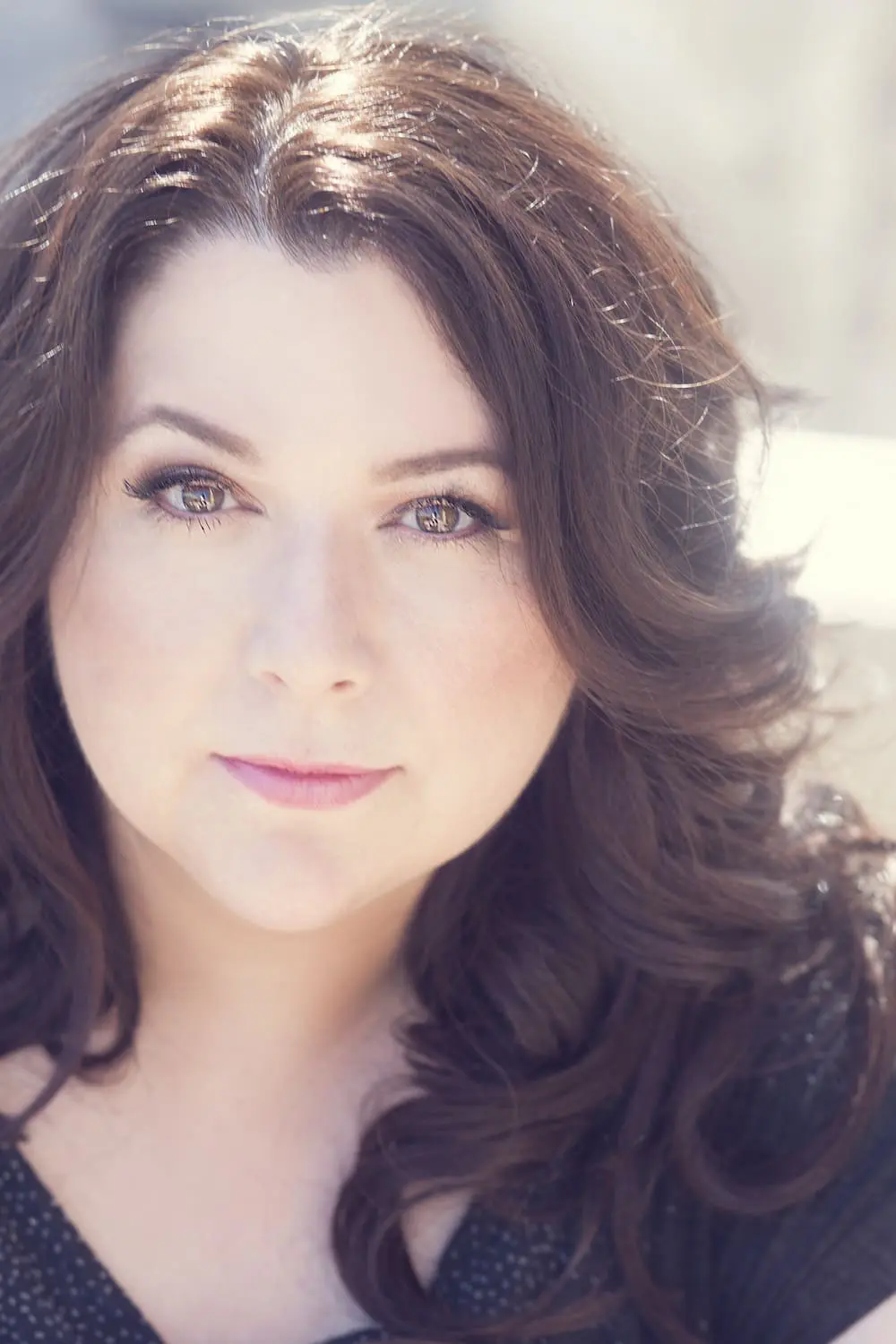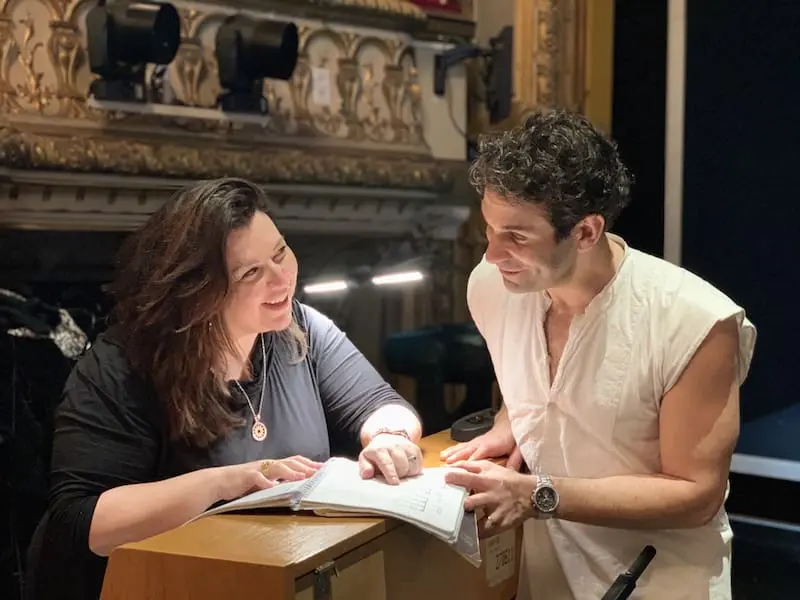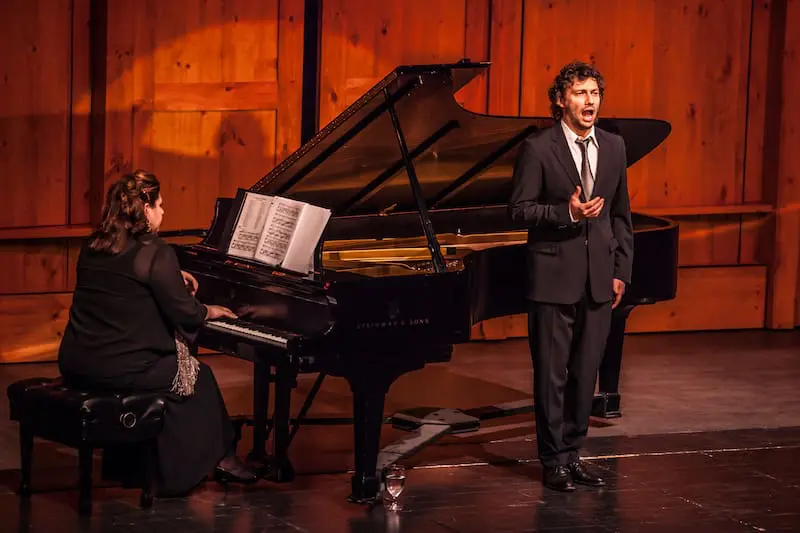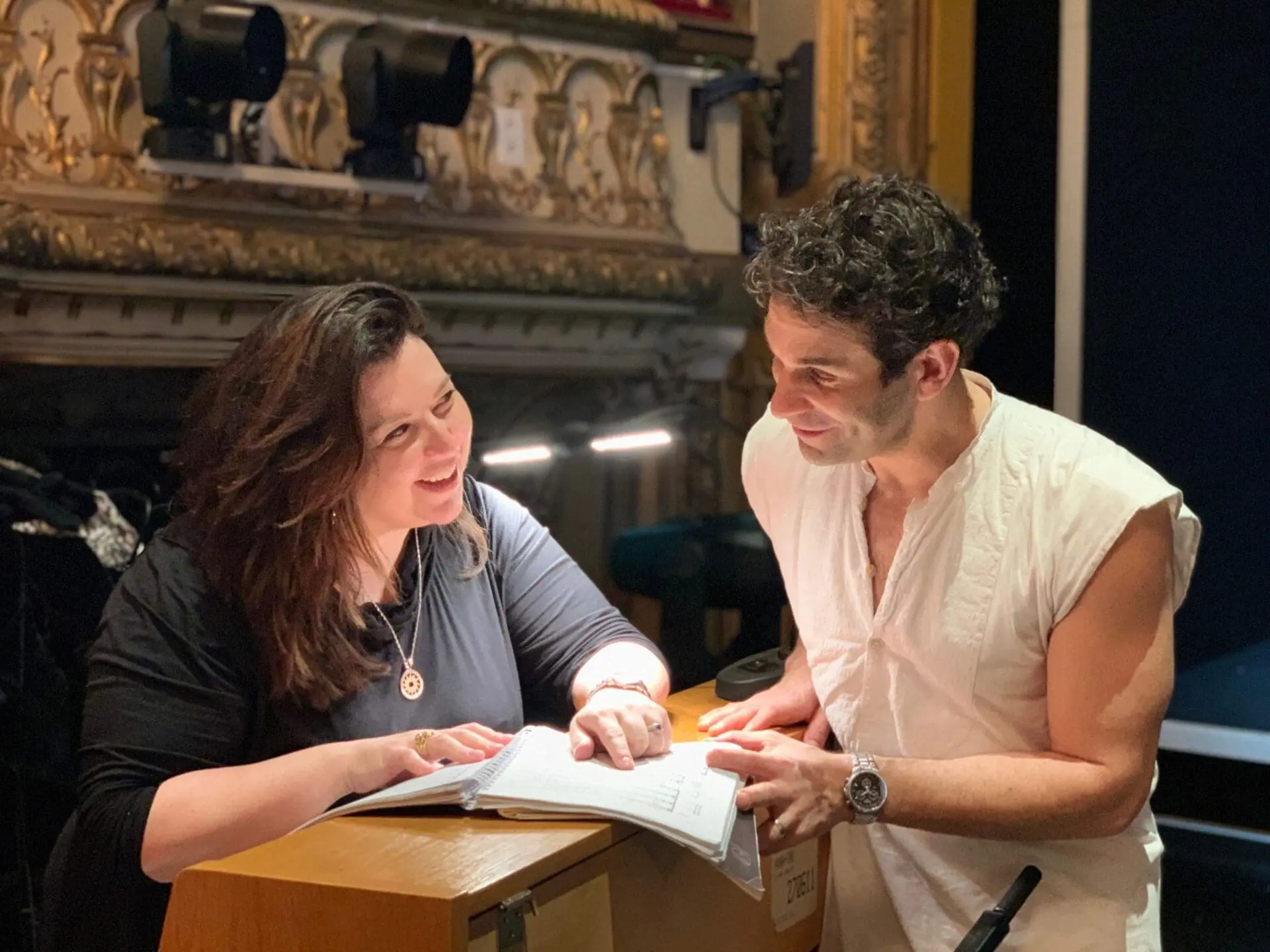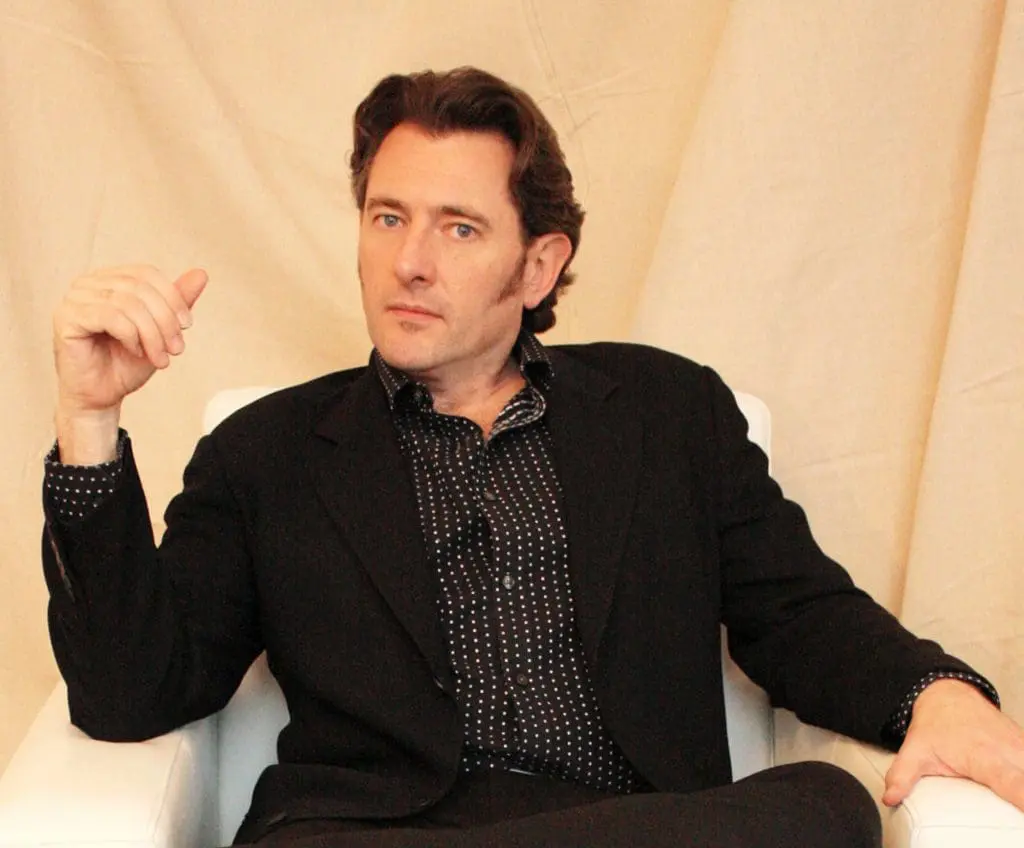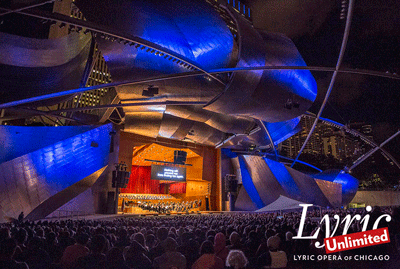A Charlottetown, PEI native, Matheson was a member of the music staff at Metropolitan Opera for several years, before moving to join Zurich Opera in the 2014-15 season, as assistant conductor and vocal coach. Matheson brought with her there a wealth of experience, having assisted such renowned conductors as James Levine, Daniel Barenboim, Fabio Luisi, Gianandrea Noseda, and fellow Canuck Yannick Nézet-Séguin.
In addition to her behind-the-scenes work, Matheson also accompanies many singers in recital, among them Rolando Villazón, Jonas Kaufmann, Piotr Beczała, Susan Graham, Joyce DiDonato, Barbara Bonney, and Marilyn Horne. She’s currently Villazón’s pianist of choice—the two just concluded a major recital tour. On the horizon is a series of recitals with new French tenor sensation Benjamin Bernheim.
The reason that Carrie-Ann Matheson is hardly a household name in Canada is simple—she has built her entire professional career outside Canada: “Yes, other than a few master classes in eastern Canada, I have not really worked in my home country,” she says. “My career began in New York, and I’ve subsequently worked in various places in the USA and abroad. I would love to work in Canada, but the timing has just never been right.”
That said, many Canadian singers have worked with Matheson, at the Met, Zurich, Lyric Opera of Chicago’s Ryan Opera Centre, Music Academy of the West and other venues. “In opera settings, I have worked with Julie Boulianne, Russell Braun, Michèle Losier, and many others, as a pianist for productions in which they were singing. And of course, I have worked with Yannick Nézet-Séguin [the Met’s Music Director].”
Canadian soprano Claire de Sévigné is one of those who credits Matheson in her development: “I had just finished my first year at the COC Ensemble and very excited to be singing my first Queen of the Night at Marilyn Horne’s Music Academy of the West,” de Sévigné recalls. “There was one performance that I wasn’t feeling 100%, and I was trying to be strong and hide my feelings. Carrie-Ann could tell that I was starting to doubt myself—if you worry about the high notes, it’s ‘Queen Suicide!’ She knew just what to say to me, to give me the confidence I needed. It takes a very special coach to talk a singer down off a cliff!”
That little anecdote says a lot about Matheson’s pedagogical savvy. She started out wanting to be a psychologist, before being “sidetracked” into a life in the arts. With de Sévigné, she was simply channeling her psychological insights into her work with singers. She feels strongly that an important part of her job as a coach is to bring out the best in each singer, and that sometimes involves extra-musical means.
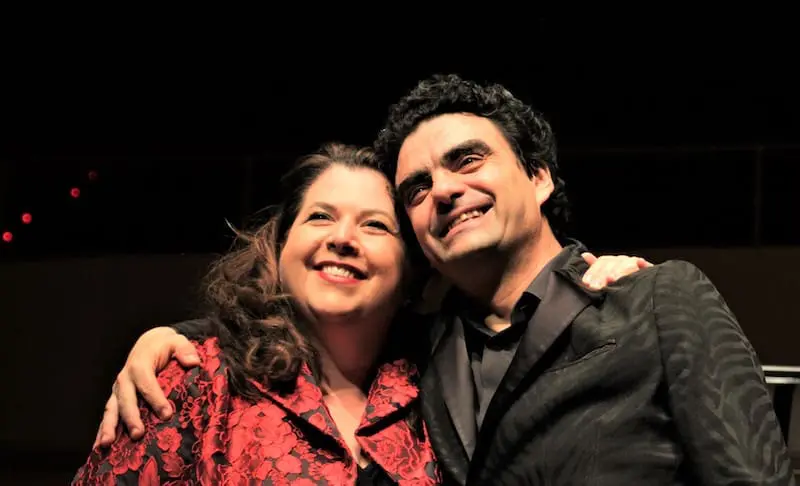
Carrie-Ann Matheson with tenor Rolando Villazón at a recent recital in Dortmund. Photo: Anne Fischer-Boertzler.
Given that Matheson now works almost entirely in Europe, it was pure serendipity that I was able to catch her for an interview over the Christmas break, when she made one of her infrequent trips to Canada to visit family. Looking relaxed and enjoying the festive season, Matheson fielded my many questions with grace and thoughtful answers:
OC: Please tell our readers a little about your early training in Canada.
CM: I studied with Jon Kimura Parker at the Banff Centre in my early teens. He gave me the push to further my training with his teacher, Marek Jablonski at the Royal Conservatory in Toronto. I then spent a year at McGill, where I studied with Dorothy Morton. I wasn’t the most disciplined student in those days, and my parents wisely decided that it would be better for me to come home to PEI. I returned to study with Dr. Frances Gray, who was the head of the piano department at UPEI. Dr. Gray was largely responsible for building my pianistic technique, and I’m incredibly grateful to her. After UPEI, I moved out west and spent a year studying with Dr. Robin Wood at the University of Victoria. It was there that my love of chamber music was truly born, and where I gave my first official coaching to an opera singer and took my first steps into the big world of opera. It was around the same time that I met Marilyn Horne, who turned out to be one of the most influential people in my life and career.
OC: Talk about starting at the top! You were enjoying a fine career as a member of Metropolitan Opera’s music staff. Why did you decide to leave to go to Zurich Opera?
CM: It’s a combination of personal and professional reasons. I felt myself starting to coast, and I’m a person who needs new challenges all the time. I could have stayed at the Met and retired there—it’s a wonderful place, and I had a wonderful job. But I wanted to see what it’s like to live in Europe, to push myself outside my comfort zone. One day, out of the blue, [Zurich Opera Music Director] Fabio Luisi asked me if I’d like to come to work with him. I met my husband, bass David Soar around that time. He works a lot in Europe, so I took a sabbatical to move there, speaking barely any German—now I do. And I stayed! But the main reason was that I’m a person who needs new challenges.
OC: I imagine that like the Met, you’re working with great singers in Zurich…
CM: Yes, I am doing Iphigénie en Tauride right now with Cecilia Bartoli. Stéphane Degout is Oreste; Canadian tenor Frédéric Antoun is Pylade. Thoas, the father, is also a Canadian, Jean-François Lapointe. Playing rehearsals is not the most inspiring of jobs, as there’s a lot of waiting and playing the same 20 bars of music over and over again. But I can tell you the two weeks of rehearsals before I came home here—it was like a Liederabend with the cast. It was musically inspiring, all day long. Cecilia—her artistry is astounding.
OC: What’s it like working in Zurich, compared to the Met?
CM: The main difference is I began to conduct in Zurich, working on a number of very different projects, from standard repertoire to really challenging contemporary music. For the last few years I’ve conducted the end-of-season gala concert given on the main stage by the artists of our International Opera Studio. This has fed an important passion of mine—coaching young singers at the beginning of their careers. It’s such a thrill to be on the podium presenting the fruits of our labour to a live audience. I’ve also had the opportunity to work on more early music here in Zurich, and on Mozart operas played on period instruments—it’s an entirely different sound world! We have a wonderful period instrument orchestra [La Scintilla], and the theatre is just the right size for those projects. And I’ve been able to work with some fantastic singers whose voices are perhaps not big enough in a theatre the size of the Met.
OC: You mentioned that you were trained to be a pianist. What made you decide to forgo a solo career to play chamber music and share the stage with other musicians? Do you still play chamber?
CM: I do play some with members of the orchestra, but the problem is with the job here in Zurich, it doesn’t leave me a lot of time. I started as a solo pianist, but I found that I didn’t like spending all my time in a room practicing. To be alone only with the piano for 8, 10, 12 hours a day, it’s not for my personality. Then I found that you can actually share energy with others, with violinists, cellists, and singers. I found that’s where I belong.
OC: I’ve had pianists tell me that while their job is to be totally supportive of the singer, they also feel it’s important to show their own personality. How much of a performance is truly collaborative, and how much of it is, heaven forbid, a bit competitive?
CM: The concerts I’m playing right now, the singer and I are equal. It’s a shared energy. If we talk about Rolando, or Benjamin Bernheim with whom I’m about to do a lot of concerts…when you work with singers on that high level, I never feel competitive. It’s two artists creating something together. When you work with a superstar like Rolando, his name is the one who draws the people in, but we are a team onstage and it’s never a competition.
OC: Does gender make a difference?
CM: I have colleagues who believe that men want women playing for them and women want men. I’ve heard all those stories before, but for me, no. It’s all about the chemistry.
OC: How would you define yourself as an artist and a person? In other words, your strengths, and maybe, your weaknesses?
CM: I am definitely a seeker, and I approach both my life and my music with curiosity. I look for new challenges, and I have always been willing to take big risks in order to push myself out of my comfort zone. This also applies to my music making. I like to push emotional boundaries when I am playing and coaching, and love to collaborate with artists who are willing to do the same. At the other end of that spectrum, I find it very difficult to fully commit to projects in which I don’t find inspiration. Luckily, that doesn’t happen too often in the opera business, as the artistic personalities of my colleagues combined with the drama of the music and the characters usually provide lots of fodder for my imagination.
OC: In one of your previous interviews, you mentioned that you wanted to be a psychologist. It strikes me as a pianist-coach, you must use your psychological insights when working with people…
CM: Not just working with people, but to encourage them to be their best, and also to get inside the operatic characters, or the mind of the poet in the song, to figure out the different shades you can use, to figure out what the composer is trying to say about the different characters. If you really examine those things, it will tell you.
OC: What was the best piece of advice you have been given?
CM: [Pianist] Warren Jones told me this years ago: “A singer’s instrument is their body; if something is not right with their singing, then their life is not easy. If something is not right with their life, it affects their body and their singing is not easy.” For me, if I have a fight with my husband, I can still play the piano because my instrument is outside my body. But if the singer has an emotional issue, everything doesn’t work right. When people talk about singers being divas, being difficult…my teacher told me a long time ago that you need to realize that their instrument is their body. It requires a lot of guts for the singers to stand in front of an audience and face forward! I had the opportunity in La sonnambula [at the Met] where I had to climb out of the prompter box [and face the audience as part of the staging.] I have tremendous admiration for the singers. People who sit in judgement at the piano, they cannot do what I do. It’s not possible to be a good collaborator if you are sitting in judgement all the time.
OC: That tells me as a pianist, you’re on the side of the singers…
CM: I’m on the side of the music. Another great piece of advice—people who do what I do have to learn a tremendous among of music, and it can become overwhelming. You only have to worry about the page that is in front of you at the time. If you focus on that one song, one aria, one scene, rather than worrying about ‘the mountain,’ you’ll get there.
OC: I’ve always wondered, do you sometimes have to sing in rehearsals?
CM: I have to sing all the time! But that skill has to be developed. When I first started, I couldn’t do it.
OC: Do you sing everything? Even Commendatore, for example?
CM: Of course! I have no shame, and I sing loud! I live with an opera singer with a beautiful voice and he makes fun of me, but that’s okay! [Smiles].
OC: Sometimes we hear conductors sing in rehearsals…
CM: And we’re awful! But we always do it with a lot of commitment. I sang the entirely role of Macbeth with orchestra in rehearsal on the stage of Zurich because the Macbeth was sick and couldn’t sing. I stood on the side of the stage with the music stand and sang in a rehearsal. I sang it loud and it was really fun!
OC: What do you look for in a young pianist?
CM: You have to have a certain level of pianistic skills, of course. You have to be able to sight read. You have to have a facility with language. Your personality has to be right—if you are a negative and judgmental person, who wants that! You have to be the kind of person who creates a safe space for learning.
OC: What advice would you give to young singers?
CM: I would say—start learning languages now. One of the things that I care about the most is that we, who work in training young musicians, that we need to turn out complete people from these programs, not just people who know how to play the piano, or how to sing beautifully…
OC: You mean complete artists?
CM: It’s more than complete artists, it’s complete people. That’s a really important thing—you have to learn how to function as a responsible human being. If you’re a singer, you are going to be spending a long time away from your family, in hotel rooms. You need to learn how to live like that. You need to learn to take care of your psychological and physical well-being. We don’t take good enough care of ourselves.
OC: A lot of these life skills aren’t taught in universities and conservatories…
CM: This is true. It is my generation of teachers that need to fix that.
OC: It strikes me that you’re very happy with how your work/life journey has turned out. But I will ask anyway—if you had to do it all over again, is there anything you would do differently?
CM: My journey has been full of some pretty intense ups and downs, but I wouldn’t trade it. My career is nicely balanced between performing in recitals with wonderful artists, working in the opera house as a coach/pianist, working with talented young artists and the occasional conducting gig. If I could do it all over again, I probably would have paid better attention in my language and music theory classes, so I didn’t have to learn all that stuff later in my life!
Joseph So writes for Opera (UK), Ludwig van Toronto and co-edited the book, Opera in a Multicultural World: Coloniality, Culture, Performance.

